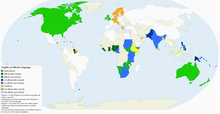English speakers
| English | |
|---|---|
| Pronunciation | /ˈɪŋɡlɪʃ/ |
| Region | Worldwide |
|
Native speakers
|
360–400 million (2006) L2 speakers: 400 million; as a foreign language: 600–700 million |
|
Early forms
|
|
|
Manually coded English (multiple systems) |
|
| Official status | |
|
Official language in
|
|
| Language codes | |
| ISO 639-1 | en |
| ISO 639-2 | eng |
| ISO 639-3 | |
| Glottolog | stan1293 |
| Linguasphere | 52-ABA |

Anglosphere
Official as majority language
Official as minority language
Co-official as majority language
Co-official as minority language
Unofficial
Not official as majority language
Not official as minority language
No data
|
|
English is a North Sea Germanic language that was first spoken in early medieval England and is now a global lingua franca. Named after the Angles, one of the Germanic tribes that migrated to England, it ultimately derives its name from the Anglia (Angeln) peninsula in the Baltic Sea. It is closely related to the Frisian languages, but its vocabulary has been significantly influenced by other Germanic languages, particularly Norse (a North Germanic language), as well as by Latin and Romance languages, especially French.
English has developed over the course of more than 1,400 years. The earliest forms of English, a set of Anglo-Frisian dialects brought to Great Britain by Anglo-Saxon settlers in the 5th century, are called Old English. Middle English began in the late 11th century with the Norman conquest of England, and was a period in which the language was influenced by French.Early Modern English began in the late 15th century with the introduction of the printing press to London and the King James Bible, and the start of the Great Vowel Shift.
...
Wikipedia
